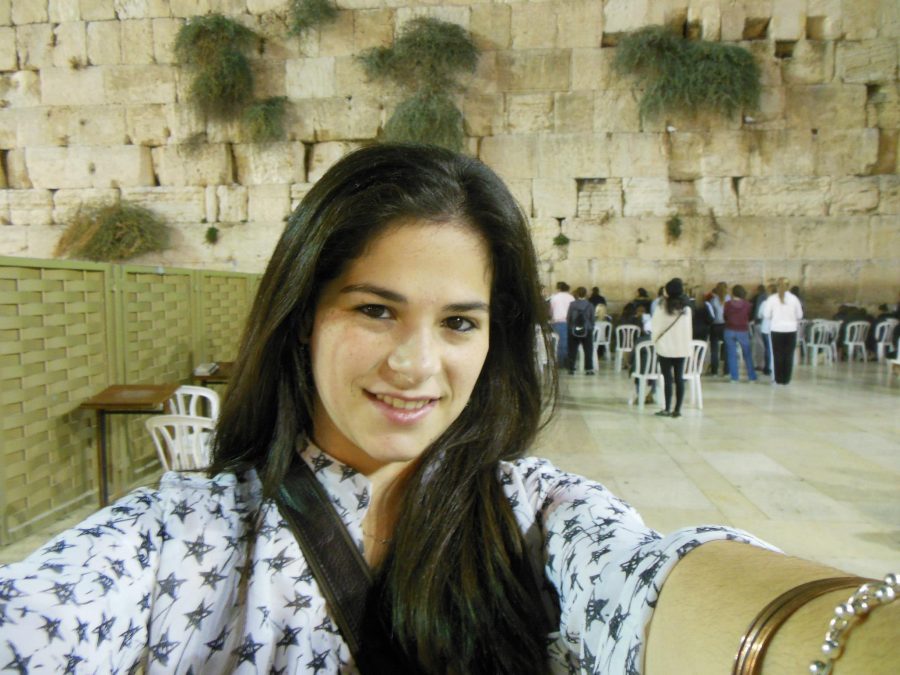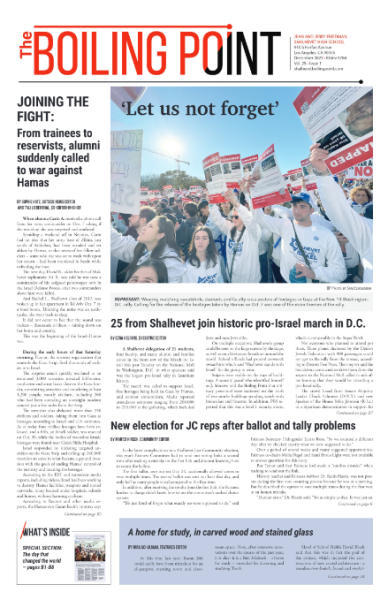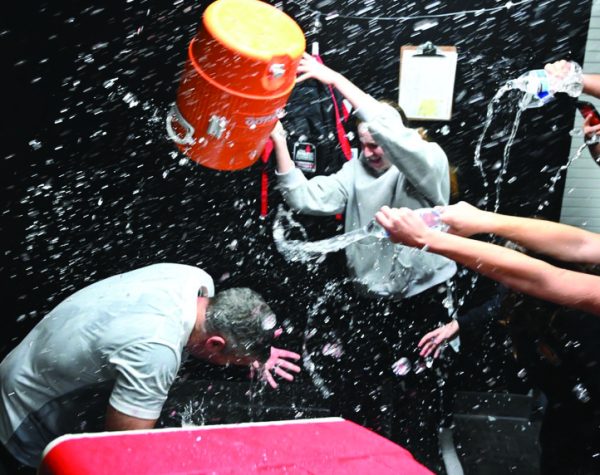‘Life as usual’ for Shalhevet alumni in Israel during Gaza war
NORMAL: Ariella Joffe ’12, here at the Kotel in Jerusalem, said girls at Midreshet Lindenbaum were discouraged from going out during the Gaza war in November, but that their parents back home seemed more worried than they were.
December 24, 2012

By Sarah Soroudi, Outside News Editor
Even if they still feel as though they are tourists, Shalhevet alumni who are spending a gap year in Israel acknowledged a sense of alarm during the eight-day Gaza war called Operation Pillar of Defense.
The war began after rockets fired into Israel by Hamas reached an all-time high in late October. Israel retaliated by assassinating Hamas’s military leader Ahmed al-Jabari Nov. 14, and Hamas responded by sending as many as 300 rockets into Israel in one day, with several landing on the outskirts of Tel Aviv and Jerusalem and in Gush Etzion. A ceasefire arranged by the United States and Egypt was finally announced on Nov. 21.
“The strange thing is that people in Jerusalem don’t feel it as much as people might think,” said alumnus David Fletcher ‘12, who is spending this year on the Nativ program. “We hear about it from the news but we don’t feel anything. The only times where we might feel something is when we go away for the weekends.”
Early in the conflict, David and his friends were planning on attending a concert in Tel Aviv, but after the first rocket hit near there the director of the program did not allow students to go.
“Other than that, life is going on as usual in Jerusalem,” David wrote in an e-mail.
Other programs set new rules restricting students’ freedom, in contrast to the norm of gap year students having the freedom to enjoy the country on their own.
“The official instructions that my school has given us is to be cautious…not to go out, unless it is necessary,” said Ariella Joffe, who is at Midreshet Lindenbaum, a seminary located in the Talpiot neighborhood of Jerusalem.
“We are not supposed to go out to eat because we are hungry or to meet friends,” Ariella told The Boiling Point in an e-mail while the war was going on. “But if people are visiting from the States then we can see them. Most of the kids just stay in the building all the time now.”
Ariella said many parents of those on her program seemed more affected than their children, worrying and calling often.
“My school did have a bomb drill,” she wrote, “and a lot of parents are worried and kids are talking about going home until this all cools down.”
Different schools and programs took different measures during the eight-day war.
“Right now, they are just telling us to be aware of what happens,” said alumna Laura Melamed ‘12, who is at Machon Ma’ayan in Beit Shemesh, wrote in an e-mail, “and to know what to do if anything were to happen to us — even though we are out of reach of the rockets.”
But Josh Meisel ’12, who is studying at Yeshivat Hakotel,said that regardless of the situation, he feels safer in Israel than in the U.S.
“Personally I always feel the safest in Eretz Yisrael, but there is always concern,” wrote Josh in an email. “Israel is a strong country and the citizens’ mentality is to go on living their everyday lives no matter the situation.”
Overall, it appears the alumni are not experiencing as much of the trauma that comes with a war as previous Israeli wars caused.
Hebrew teacher Shlomit Abrams recalled her experience while living in Israel during three wars — the Six-Day War in 1967, the First Lebanon War and the Gulf War — as “terrible.” Shlomit was introduced to gas masks and forced to temporarily relocate her home.
“I had to go to work every day and then drive for hours back to where my parents were staying, because where I used to live wasn’t supposed to be the safest area,” said Shlomit, who lived in Givattaim at the time. “Sometimes I thought that war would be easier than everything I had to do to prepare for war. It [the preparation] was a nightmare.”
According to the Israel Defense force, during Operation Pillar of Defense 1,506 rockets were fired toward Israel from Gaza, with 800 striking Israel while 421 were intercepted by the Iron Dome missile-intercepting defense system. Six Israelis, including five civilians, were killed and 129 were injured.
In Gaza, the toll of casualties is less certain, with different sources reporting different information. Most sources say between 150 and 180 Palestinians were killed, with as few as 40 or as many as 103 being civilians, and more than 1,000 injured.
The IDF said it used five different strategies to avoid harming civilians in Gaza, including announcing in advance through phone calls, leaflet drops and “roof-knocking” – dropping a noisy, non-lethal bomb on the roof – before a rocket launcher or other target was be hit. It also said it destroyed 980 underground rocket launchers, 26 weapons manufacturing and storage facilities and dozens more rocket launchers and launch sites.
Specially targeted were Hamas’ long-range Fahjr-5 rockets, which are made in Iran and capable or reaching many Israeli cities.














